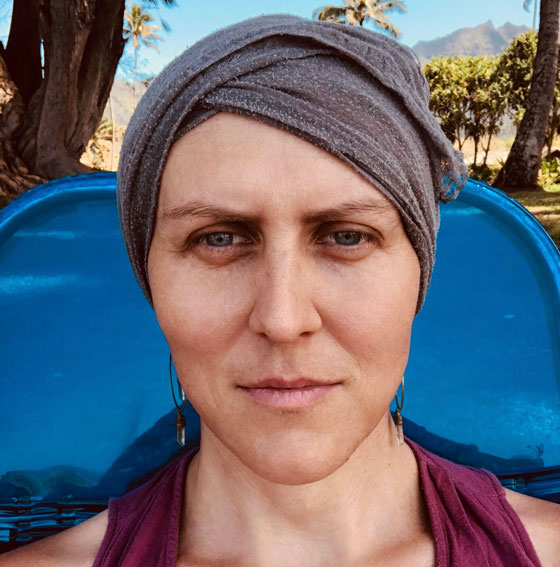On our first meeting, via video link, Be Scofield was somewhere on the East Coast of the United States. She wouldn’t say where exactly, but it was rural and peaceful. Her wood cabin, where she lay on a bed munching blue corn chips from a bag, was dimly lit. The scarf that’s always wrapped around her head is simply Scofield’s look, not a sign of religious devotion. Her undisclosed location is fitting for the anti-cult activist who seems to find a story of abuse wherever she goes, oscillating between trailblazing superhero and enemy number one for many spiritual seekers.
“I’m willing to stand up and fight against harming people,” said the 38-year-old journalist, who is transgendered and queer. “So it’s a very interesting path I have developed, because I’m not going after the right-wing fundamentalists. Everyone I write about happens to be part of the progressive left. I’m shooting myself in the foot, but no one is going to do it otherwise.”
One-Woman Posse
Scofield has become a one-woman posse wielding electronic media skills and a rapidly expanding network of sources who have helped her pull a dozen people around the world from their thrones. According to the late Margaret Singer, psychology professor at Berkeley, there are about 2,000 to 5,000 cults in America alone; other experts estimate less than 1,000. Not all of them are dangerous or destructive, Scofield said.
“Cults are not illegal. I’m not just after weird belief systems for no reason. But there are so many forces at play when someone gets involved in a closed system like that. Many people don’t understand how powerful and seductive those group dynamics are.”
Emboldened in part by the #MeToo movement, former and current cult members and spiritual seekers have begun to come forward to accuse famous healers like Brazil’s John of God (João Teixeira de Faria), the leaders of Buddhist groups Rigpa and Shambhala International, and self-help star Tony Robbins of sexual misconduct or abuse. In June, Keith Raniere, founder of Californian multi-level marketing scheme NXIVM, was found guilty on all counts in a sensational sex cult case. Last year, the international Agama yoga school was brought down by rape claims — the work of Scofield.

After Scofield revealed Swan’s narcissism and her quest for global domination, the leader of the Teal tribe ended up on the front page of The Daily Mail and in a podcast series. Her name disappeared from the line-up for the Hay House World Summit 2018 — a reputable global symposium for inspirational speakers. “There is now a ceiling to how far she can take herself,” says Scofield.
Swan runs a YouTube channel with half a million subscribers, ranging from Europe to South America. A “posh prophet in killer heels,” according to Scofield, she claimed to have the knack for astral travel as an alien, not to mention X-ray vision. Swan was also able to sound blatantly racist or make dangerous medical claims in her videos. Some of her followers, called “Tealers,” tattoo themselves with her symbol.
Scofield doesn’t get paid for her articles, which can bring up to 100,000 readers apiece; her supporters donate money. Nor does Scofield normally rely on police records or affidavits. She gets constant requests for help but only kicks into action if she has four or more sources accusing a group or a guru: “If I have 17 testimonials against you, then I’m sorry. What you’re getting is not going to jail. I’m a rogue person, fighting justice in my own way.”
Lawless
At the annual International Cultic Studies Association conference in the UK in July, her name came up in a talk by a British man who left a Hindu cult 15 years ago, citing her mercenary work as “absolutely invaluable,” because she is “cutting off the head of the snake of various cults.” Alexandra Stein, Britain’s leading academic studying cults, also commented on Scofield: “The cult phenomenon is real, it’s harmful, and we need people like her who can give it a voice.”
“This is such a fascinating moment in history,” she said. “Some of the most powerful men on the planet who are supposedly untouchable are being exposed.” But some of her marks have been women. Teal Swan, known as the “Gucci Guru,” is, according to Scofield’s report, “a sexy, sultry, spiritual New Age sensation taking the world by storm. This sage is a fox, and she knows it.”
These voices are mainly anonymous — a positive in the eyes of many cult survivors who are often traumatized or paranoid and want the truth to come out without being in the spotlight. However, Scofield’s critics discredit her for not revealing her sources or telling both sides of a story. She has been accused of sensationalism, witch-hunting, assembling quotes out of context to fit her narrative and of building her own following on top of ruining cults.
Others react in more serious ways. Gano Grills, a member of the rap group Wu-Tang Clan, reinvented himself as the leader of Galighticus, an obscure sect on a mission to usher 144,000 people off the planet. After Scofield exposed his crude ideology in May last year, he rang her up. “You’d be surprised who I know,” Grills apparently told her before he hung up.
Her exposés also invite legal trouble. In June, “Sounds True” author and meditation teacher Aaravindha Himadra filed a $250,000 defamation lawsuit against Scofield. The claim stated that Scofield had lied and acted with “reckless disregard” of the truth in a January 2019 article that explored the mysterious death of one of Himadra’s students 13 years ago on Orcas Island, in Washington, where the master of the spiritual group Sambodha (formerly Children of the Light) owns a home.
“It’s an attempt to punish me for uncovering suspicious elements,” says Scofield now. “The sole intent of this frivolous lawsuit is to block my right to free speech around facts of this case they don’t want exposed. It’s meant to financially drain me and stop other journalists from going near it.”
Some of her attackers resort to transphobic insults, or worse. Scofield had to delete photos and old posts from Facebook. “These people are going to make up anything they can about me.” She identifies strongly with Paulette Cooper, who went up against The Church of Scientology in the 1970s. The cult tried to paint the best-selling author as mentally ill and broke into her home to forge a bomb threat. “I feel stunted to share my own life story openly and honestly,” Scofield said on our second call.
To stay out of range of trouble, Scofield’s site, www.gurumag.com, is hosted in Iceland, where the content is beyond copyright claims of most countries. For that, she has been called lawless, a criminal. In the past, defamation claims didn’t bother her. “Who’s going to find me to serve me papers? I move around. I just ignore them all.” That was until the Sambodha lawyers found out her former name and a family member’s address.
Under the Spell
Scofield doesn’t bring spiritual leaders down because she hates the woo world. She understands it more than most. She even believes in reiki and astrology. The “guru hunter” — a term she dislikes because “not all gurus are bad or do harm” — has her own history in a cult-like group.
In 2006, as a cultural anthropology student at the California Institute of Integral Studies (CIIS) in San Francisco, a hothouse for the human potential movement, Scofield fell under the spell of two professors who were later fired for creating a cult-like environment, exploiting students and causing serious dysfunction. Scofield finally walked out of the course and started to write about it, putting the pressure on the faculty to investigate. After the group unraveled, she experienced wrenching emotional distress and spent one night just screaming in pain. “Many of us were deeply wounded and brainwashed. For years I had PTSD, and probably still have it today.”
Despite these scars, Scofield attended an interfaith Unitarian Universalist seminary. But instead of becoming a minister, she explored social issues and abuse in alternative movements, writing about transphobic feminists, violent Buddhists and the abuse inflicted by new-age heavyweight Andrew Cohen.
Her past, she said, makes her attuned to subtleties that the common public might not pick up. “Cults don’t only exist in far-off places where the members wear strange garb and chant in tongues. The mechanisms of control and authoritarianism can seep into our most modern, ‘conscious’ structures and institutions.” Scofield is not interested in the “straight-up cults” like Scientology or the Moonies that have had decades of public scrutiny. “I’m looking into emerging groups who want to have a live-in community around their teaching to gain power.”
In 2017, she stumbled upon Bentinho Massaro, aka the “Tech Bro Guru,” in Sedona, Arizona — a town full of psychics, UFO spotters, ashrams and crystal shops. “His devotees were everywhere,” Scofield said. “They believe he can control the weather with his mind. I googled him that night and then immediately went in. He brilliantly uses start-up principles to create a legitimately dangerous, real-life, 21st-century cult.” She claims he was brainwashing people, that they were yelled and screamed at and told to kill themselves if they didn’t have a purpose in life.
To infiltrate his network, she used an alias, “Shakti Hunter,” and introduced herself as a web designer and marketer. “I told them I was impressed with their digital game.” They invited her to volunteer. Before long, a former staff member told her that she feared Massaro was setting people up for a mass suicide, calling it “The Harvest.”
Scofield published her findings in December 2017 on the blog platform Medium. “I’ve never received so much blind hatred from thousands of people who I’ve never had a dialogue with,” she said. Nine days later, one of Massaro’s followers committed suicide, and the guru shut down his Sedona operation and fled with his two girlfriends. “He’s probably more on the edge now,” claims Scofield. “Their propaganda still outweighs my warning.” A VICE documentary and Playboy article followed, based on her initial insight.
Wreckage
Scofield says she feels a responsibility to those left in the wreckage of cults she has exposed. Agama is such a case — a popular yoga tantra school on Koh Phangan, in Thailand, that has had thousands of students from around the world in the last 15 years. It was also a breeding ground of sexual transgression and misogyny, all in the name of wellbeing and spiritual growth. The allegations by 31 women against tantric guru Swami Vivekananda Saraswati, originally Narcis Tarcau from Romania, and some of his male teachers go as far as rape.
Long-term students were groomed to sleep with the yoga master, claiming he could heal them. Scofield’s exposé sent Swami temporarily on the run, threw the island community into turmoil, alerted international media to the scene and led to two women from Australia filing rape complaints. The local police raided the school, and a yoga hall burned down. Agama was kicked out of the international Yoga Alliance. A six-part documentary about the “rape cult” is currently being shot on Koh Phangan.
Scofield has set up a website that supports the victims. “It’s not just about the people who step down. There’s a whole community that gets destroyed with them. Even if some of them have turned awful, they’re still brainwashed and controlled victims.”
Scofield’s most shocking and controversial report to date reveals in disturbing sexual detail how the founder of The New Tantra (TNT), Australia-born Alex Vartman (originally Sandford Perret), controlled a Dutch sex and self-development organization that is popular in Europe. This time, the pushback had consequences. Hours after the TNT story broke and shook up the tantra scene, Scofield was suddenly banned from Medium, where her work had almost 1 million views at the end of a year that has seen more cults and questionable gurus come into the spotlight than ever before.
Despite the setback for the self-publishing online journalist, TNT was damaged: They canceled their first course that was planned for New Zealand in March 2019. In July, the Dutch newspaper Volkskrant published an article about TNT that repeated many of Scofield’s original accusations. Vartman, who stepped back from his leader position three years ago, replied in a 35-minute-long video, dressed as a woman called “Alexa,” flat-out denying all the accusations. He also referred to Be Scofield’s “slanderous” portrayal of him: “We had that removed from Medium.” Medium didn’t comment for this article.
One of the original testimonials of Vartman‘s alleged sexual abuse came from Matthias Schwenteck, who once was the sex guru’s co-teacher as TNT was starting out. The somatic consent coach from Berlin experienced the other side of Be Scofield’s work when a friend of his, Bali-based Ayurvedic healer Uma Inder, was in the firing line last year as the “Yoga Barn guru.” “Just because I only know the good side of someone doesn’t mean these things don’t happen,” says Schwenteck on a call from the Netherlands. “In her case and others, I have seen it lead to more accountability. It’s a cleansing process.”
More accusations of sexual transgression against four well-known American and Australian tantric healers have emerged through Scofield’s research. One victim took an alleged abuser to court but lost. Another alleged perpetrator stepped down.
The latest controversial work was about Mooji, a popular spiritual guru in Portugal, the biggest out of all the names on the American’s target list so far. Again, once Mooji’s manipulation was revealed and the bubble around his multi-million-dollar enlightenment industry burst, the backlash by his followers was immense. But what was new this time was that several people also spoke out on YouTube about their bad experiences. “There has been a real shift in the way these stories are perceived now, also in the context of #MeToo. However, there is still so much spiritual bypassing and victim shaming going on,” Scofield tells me.
According to Canadian yoga writer Matthew Remski, author of “Practice And All Is Coming,” who researches cult dynamics and institutional abuse, it’s hard to tell what long-term impact Scofield’s “gonzo-vigilante work,” as he calls it, will have on the specific groups she outs. “Be is a survivor telling survivor stories in the first way they ever get heard: by someone who knows that where there’s smoke there’s fire, and who knows that trauma will only be disclosed if it is believed. Every established fact begins as an intuition, and Be’s intuition is lit.”
Soon she will be moving again while she’s writing her first book. It’s a nomadic existence. She’s single, homeless and practically broke. She finished her Orcas Island story in the Joshua Tree desert in Southern California while living in her car, writing in the backseat, sleeping with the engine running all night to stay warm. But Scofield has a Hollywood agent — “there is interest in the Bentinho Massaro story for a film,” she says — and a law firm helping her pro bono to fight the SLAPP suit. Shakti Hunter might not need a bodyguard yet, but maybe a new alias.
*[This article was originally published by The Spinoff.]
The views expressed in this article are the author’s own and do not necessarily reflect Fair Observer’s editorial policy.
Support Fair Observer
We rely on your support for our independence, diversity and quality.
For more than 10 years, Fair Observer has been free, fair and independent. No billionaire owns us, no advertisers control us. We are a reader-supported nonprofit. Unlike many other publications, we keep our content free for readers regardless of where they live or whether they can afford to pay. We have no paywalls and no ads.
In the post-truth era of fake news, echo chambers and filter bubbles, we publish a plurality of perspectives from around the world. Anyone can publish with us, but everyone goes through a rigorous editorial process. So, you get fact-checked, well-reasoned content instead of noise.
We publish 2,500+ voices from 90+ countries. We also conduct education and training programs
on subjects ranging from digital media and journalism to writing and critical thinking. This
doesn’t come cheap. Servers, editors, trainers and web developers cost
money.
Please consider supporting us on a regular basis as a recurring donor or a
sustaining member.
Will you support FO’s journalism?
We rely on your support for our independence, diversity and quality.







